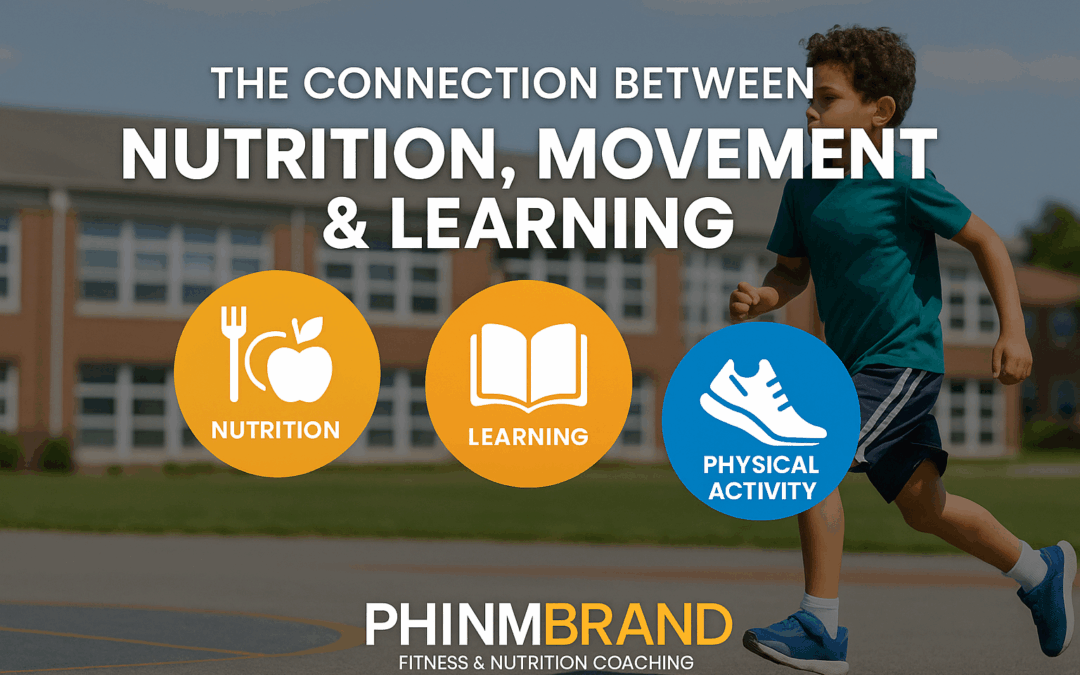🧠 Healthy Food + Movement = Better Learning: What Every Parent Needs to Know
If your child is struggling to focus in class, stay motivated with homework, or regulate their mood during the school day, the answer may not be tutoring or more screen time breaks, it might be what they’re eating and how much they’re moving.
Research is clear: nutrition and physical activity directly impact how children learn, behave, and feel.
They’re not just health issues, they’re learning issues.
Let’s explore how food and movement shape your child’s brain, and what you can do today to help them perform better in school and in life.
🍳 1. Nutrition Fuels the Brain
The brain is a high-performance engine and it needs high-quality fuel. A child’s ability to concentrate, retain information, and manage emotions is deeply tied to what they eat.
Why Breakfast Matters
Children who eat a balanced breakfast:
-
Perform better on reading and math tests
-
Have better memory recall
-
Are less hyperactive and more emotionally regulated
The worst offenders? Skipping breakfast altogether or loading up on sugary, processed carbs. That rollercoaster of blood sugar leads to energy crashes, irritability, and poor concentration.
✅ Quick Tip: Start the day with protein + fiber + healthy fat — like eggs and toast, yogurt and berries, or a smoothie with protein powder.
Brain-Boosting Nutrients
Certain nutrients are especially critical for brain development:
-
Omega-3 fats support memory and mood
-
Iron enhances attention span and stamina
-
Zinc and B-vitamins aid in focus and cognition
Deficiencies in these areas can show up as “behavior problems” or “poor performance” in school — but they often stem from poor eating habits.
🏃♀️ 2. Movement Builds Brainpower
Physical activity isn’t just a way to tire kids out, it literally changes how the brain functions. Regular movement increases oxygen and nutrient flow to the brain, stimulates growth of new brain cells, and improves communication between regions responsible for focus, memory, and mood regulation.
Key Benefits of Daily Activity:
-
Improved executive function (planning, focus, self-control)
-
Increased academic performance
-
Reduced symptoms of anxiety, ADHD, and depression
-
More resilient behavior and better emotional regulation
And it doesn’t take hours. Even 20 minutes of movement before school can boost cognitive performance all day long. Maybe PE during 1st period?
📚 What the Science Says: Spark by Dr. John Ratey
In the groundbreaking book Spark: The Revolutionary New Science of Exercise and the Brain, Harvard psychiatrist Dr. John Ratey presents compelling evidence that physical activity is one of the most powerful tools we have to optimize brain function.
Here are a few game-changing insights from the book:
-
Exercise increases BDNF, a chemical that helps the brain grow, adapt, and learn, often called “Miracle-Gro for the brain.”
-
Kids with ADHD, anxiety, and depression benefit tremendously from aerobic movement, it regulates the same neurotransmitters that medications target.
-
A real-world school in Naperville, Illinois, showed dramatic academic improvements after implementing morning exercise programs, outperforming peers globally in math and science.
-
Dr. Ratey doesn’t just suggest exercise helps learning — he proves that it primes the brain for academic success.
If you’re a parent or coach, Spark is a must-read to understand how movement is foundational to mental and cognitive development.
🔁 The Power of Both: Nutrition + Movement
When kids eat well and move regularly, the impact is exponential.
Together, they:
-
Improve memory and retention
-
Enhance focus and attention span
-
Support mood and behavior regulation
-
Increase confidence and self-esteem
Think of nutrition as the building blocks and exercise as the activator. One without the other limits the potential. Together? They unlock your child’s full performance capacity.
💡 How to Put It into Action
You don’t need to overhaul your family’s lifestyle overnight, small, consistent changes are where momentum begins.
✅ Start Here:
1. Upgrade Breakfast:
Add a protein source to every morning (e.g., eggs, nut butter, yogurt, protein smoothie).
2. Move Before School:
Even a short walk, bike ride, or 10-minute movement circuit can spark better focus all day. Maybe 1st period PE?
3. Make Snacks Functional:
Swap chips and cookies for trail mix, string cheese, fruit, or whole grain crackers with hummus.
4. Prioritize Sleep:
Nutrition and exercise both support healthy sleep, and poor sleep can undo all their benefits.
5. Protect Recess & PE:
Advocate for daily physical activity in schools and avoid using it as a punishment.
🧭 Your Role as a Parent or Coach
Creating an environment that supports healthy food choices and movement isn’t about making kids “perfect”, it’s about giving them tools to thrive mentally, emotionally, and academically.
When parents prioritize movement and model healthy eating habits, kids are more likely to adopt them naturally, not out of pressure, but out of identity.
💬 Final Thought
Don’t underestimate the basics.
Smart food + consistent movement = a better brain.
Not just for test scores — but for life skills, emotional resilience, and self-belief.

